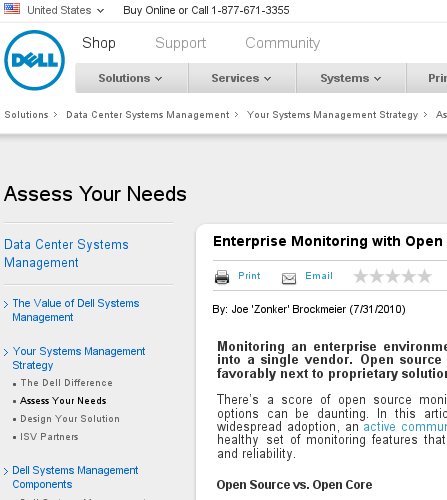08.28.10
Posted in IBM, Microsoft, Novell, Oracle, SCO, UNIX at 3:31 am by Dr. Roy Schestowitz

Summary: Novell and SCO continue to wrestle over the issue of costs/bills and IBM tightens its relationship with Novell
NOVELL has been fighting against SCO for its own interests (including the shareholders’). But Novell’s action happens to have also been beneficial to IBM and others. Will Novell see much money coming out of it? Probably not, based on this latest post from Groklaw. It does, however, seem like Novell will keep the “UNIX” asset, which raises the company’s value when it sells (maybe to VMware). It raises many questions because VMware, for instance, is run by Microsoft veterans and giving them UNIX can be deadly. From Groklaw we learn about SCO’s latest objection to Novell’s bill of costs:
What that means is that SCO would like to pay less. If Novell had lost, and they had been ordered to pay SCO’s bill of costs, SCO would have fervently argued the opposite. Last time, SCO was able to get a bit knocked off the bill, so they may again. But they’ll probably still have to pay something. But will they? In real life, I mean. Not on paper.
The SCO case remains an area that is mostly explored by this one Web site. Unless one actually attends the court hearings or downloads documents, this case is almost invisible and irrelevant by now. The SCOracle case matters a lot more [1, 2, 3, 4, 5, 6, 7, 8, 9, 10, 11, 12] and Oracle even hired SCO's and Novell's lawyers. Groklaw has diversified its scope in the sense that it expanded topics it covers to include Apple and Oracle cases.
It is worth highlighting the fact that IBM still collaborates in some senses with Novell. They even present together and we last mentioned this here. Oracle, IBM, and Novell are all involved in the SCO case — a case which was partly funded by Microsoft in order to damage GNU/Linux. █
“…Microsoft wished to promote SCO and its pending lawsuit against IBM and the Linux operating system. But Microsoft did not want to be seen as attacking IBM or Linux.”
–Larry Goldfarb, BayStar, key investor in SCO approached by Microsoft
Permalink
 Send this to a friend
Send this to a friend
08.25.10
Posted in Deception, Dell, IBM, Marketing, Microsoft at 10:20 am by Dr. Roy Schestowitz

Who pays for articles you read in “official” sites and why?
Summary: IBM is buying the news, this time in India
The Economic Times publishes a lot of Microsoft PR and earlier this week we caught it publishing a “sponsored story” for IBM. Yes, it even says that it’s a “sponsored story”, so there is no question about it. Is this the future of journalism? Even in the Economic Times, which is considered a mainstream publication and “official” source? What is the role of journalists then? Are they becoming just another tier in PR operations, like Microsoft's Peter Galli for instance? It seems like Dell has begun something similar with journalists (see screenshot above with former Noveller Zonker).
Either way, see for yourselves one paragraph which IBM paid for. To the authors’ credit (probably IBM), at least they are honest about it over at the Economic Times. Some others would probably omit the evidence of sellout altogether:
Not only IBM, but there are other companies too that provide collaborative tools. Novell GroupWise gives a wide range of collaborative tools to create a “plugged in” work environment. Novell Pulse enables real-time communication, authoring and social messaging for the enterprise. Microsoft offers Live and NetMeeting. But IBM’s Sametime is a class apart.
Says who? IBM? The Economic Times? It doesn’t matter. It’s all just PR masquerading as journalism [1, 2], even in a major paper. █
“[A]fter analysing a five-day working week in the media, across 10 hard-copy papers, ACIJ and Crikey found that nearly 55% of stories analysed were driven by some form of public relations. The Daily Telegraph came out on top of the league ladder with 70% of stories analysed triggered by public relations. The Sydney Morning Herald gets the wooden spoon with (only) 42% PR-driven stories for that week.”
–“Over half your news is spin”
Permalink
 Send this to a friend
Send this to a friend
Posted in GNU/Linux, IBM, Microsoft, Mono, Novell, Oracle, SCO at 3:41 am by Dr. Roy Schestowitz

Summary: Adobe boss cites Microsoft MVP de Icaza as he tries to incite people against Oracle; SCO case updates help show that Oracle is not all “evil”
THE REGISTER has this new article titled “Oracle forms new ‘axis of evil’ against open source, claims Adobe” and it opens by saying that “Oracle has replaced Microsoft as the FOSS community’s number one enemy, according to Adobe System’s open source boss.”
Here is Adobe’s original post (to avoid misrepresentation by The Register) which says “see also this great post by Miguel de Icaza” (he distorted the facts about Oracle and Java [1, 2, 3, 4, 5] in order to promote Microsoft/.NET/C#). Adobe is a drug dealer-like fake friend of Free/Open Source software and a real nuisance to GNU/Linux users. It is in no position to tell Free software which companies are greater enemies to Free software as that would be hypocritical.
One area where Novell remains helpful (to itself but also to others) is the SCO case, where Oracle too seems involved at the moment. People must remember that Oracle is still the steward of many Free software projects like OpenOffice.org, VirtualBox, and even MySQL. Its lawsuit against Google is described by some people as defensive or reactionary. Anyway, from Groklaw we have:
Cahn Replies to Reservations of Rights by Novell and Oracle, HP and US Trustee – Update
[...]
But then it gets tricky. Cahn’s position is that SCO owns “explicitly or impliedly” — that last bit being the sticky part — certain rights, to develop UnixWare, for example, to license or sublicense UNIX technology as per Amendment 2, in his interpretation, and the ownership and copyrights to any new code SCO itself developed after the APA. OK. How about a list on that? For real. How about a list of copyrights? So that is what Cahn proposes selling, “Debtors’ rights to exploit and develop Unixware and the Software Business.”
That’s what they told the ‘new guy’ in this company. What planet do they live on? It’s somewhat bizarre that a Novell vice president promotes Microsoft along with Novell while Novell is fighting the Microsoft-funded SCO and even fights Microsoft in the WordPerfect case (new update from Groklaw, see [1, 2] for background). Groklaw has another post about SCO’s bankruptcy (which SCO may have faked for convenience and pardoning). Here is new proof that SCO knew about IBM’s Linux involvement as far back as 1998 (back when Bill Gates called Linux “LUNIX” because it was more obscure).
Look what I just found, SCO’s Partners page from 2002, on Internet Archive, and lo and behold, it provides proof positive that SCO, then calling itself Caldera, knew that IBM was involved with Linux as far back as 1998. That’s the year Santa Cruz and IBM signed the agreement regarding Project Monterey, executed in October of 1998. No one, therefore, Santa Cruz or Caldera, had any reason to be in the dark about IBM’s Linux activities while IBM was also working on Project Monterey.
Now that the old caldera.com pages are on Internet Archive again, thanks to SCO selling off the domain name, many interesting things are surfacing, and we find out why SCO tried to hide them for so long. They should have waited a little bit longer.
It was funnier when SCO published "Blah. Blah. Blah." last year. █
Permalink
 Send this to a friend
Send this to a friend
08.23.10
Posted in GNU/Linux, IBM, Microsoft, Vista 7 at 4:36 pm by Dr. Roy Schestowitz


Summary: Vista 7 refunds become possible, Microsoft apologist Florian Müller makes friends in the Mono camp, and MSNBC writes about malware on the Spanair computer system, but somehow it doesn’t mention Windows
E
ARLIER TODAY we wrote about Tim's efforts to open the door for Vista 7 refunds in the UK. There’s good news because it’s succeeding. A few hours ago Tim wrote: “My quest for a Windows 7 refund has gone well. Apparently Acer will be refunding me. I’ll keep people posted!”
This is great news and it can help British people (even Europeans) demand a refund not just from Acer. It’s all about precedence and it needs to be publicised. Refunds are possible if one tries hard enough, knows which prior cases to cite, and knows the exact procedures to follow.
Let’s face it; Vista 7 is just lipstick on a pig (Vista) and security-wise it’s even worse than predecessors. The former managing editor of Linux Today has just had to use Vista 7 for a while and he says that “looks aren’t everything” (referring to deceiving appearances and labels). From his post:
This anecdote kept bopping around my head this week, when I’ve had the opportunity to work on Windows 7 more than I usually do.
[...]
It’s still Windows.
And that that means is that no matter how much anti-virus software I would put on this platform, and how many security precautions I take, whenever I start visiting the Internet, which is easily 50 percent of where I do my job, the risk factor for getting infected by malware is far more than using Linux.
The lesson here, as always, is that pretty looks aren’t everything. It’s easy to get distracted by the gadgets, gimmicks and all the shiny, especially as a geek. But is it worth your data? Because, to me, the ability to keep my work and personal data secure is way more important than transparent windows or
And, it’s not like Linux doesn’t have eye candy and shiny of its own, if that is indeed what floats your boat. GNOME, KDE, and even LXDE offer gorgeous, streamlined interfaces that are getting better with each release.
Want to know who happily uses Vista 7? Florian Müller, the guy who pretends to represent “FOSS” interests when it comes to patents (while defending RAND, which is incompatible with Free software). Well, Müller is a complicated story of what seems like a Microsoft lobbyist. Right now (all day today) he is busy talking with all the Mono boosters and those who only ever attack Techrights while defending Microsoft. It’s like he finally found his colleagues. It’s amusing really as it invalidates and voids any credibility he had left as a lobbyist for “FOSS”. It’s a fake friend.
A couple of days ago we showed how Müller blamed Trojans and malware on IBM (he wants people to believe that IBM — not Microsoft — is a threat to “FOSS”). Watch this coverage from MSNBC. Being Microsoft’s pseudo-press the imported article says and does nothing to call out Windows. MSNBC was previously caught censoring an existing article which named Windows as the cause of a problem. Here is a portion of this article: [via]
The malware on the Spanair computer has been identified as a type of Trojan horse. It could have entered the airline’s system in a number of ways, according to Jamz Yaneeza, head threat researcher at Trend Micro.
Some of the most likely ways are through third party devices such as USB sticks, Yaneeza said, which were responsible for the International Space Station virus infection in 2008, or through a remote VPN connection that may not have the same protection as a computer within the enterprise network. Opening just one malicious file on a single computer is all it takes to infect an entire system.
“Any computer that is connected to a network is vulnerable to a malware infection,” O. Sami Saydjari, president of Cyber Defense Agency, told TechNewsDaily. “Standards have not been set to protect critical infrastructure.”
Those who foolishly believe Müller might think that it’s a mainframe’s fault. He increasingly becomes a source of humour. █
Permalink
 Send this to a friend
Send this to a friend
08.21.10
Posted in IBM, Microsoft at 9:09 am by Dr. Roy Schestowitz

Summary: Without any supportive evidence, Florian Müller blames IBM for the Spanair crash, though not without a challenge
MICROSOFT apologist (presumably for a living) Florian Müller continues his endless campaign against IBM — a campaign which even the FFII is publicly denouncing him for. As André Rebentisch puts it, “I am stunned, a top-competition lawyer like Thomas Vinje (who usually restrains himself) claims you worked for Microsoft Corporation in the Oracle case. You don’t refute it. I guess SAP pulled more strings behind the scenes in this case and Monty didn’t just pretend to be mad about the sale. But when Vinje says so the Commission does believe the same.” Read on, it’s worth it.
It has gone too far. Müller is even bringing up World War 2 to serve his cause when he loses the argument over IBM (trying to describe Microsoft is the “lesser evil”).
If that’s not bad enough, last night we spotted Müller sinking to new lows, trying to ascribe a tragic plane crash to IBM’s position in the mainframe market. “Shocking,” Müller states, “mainframe trojan may have contributed to fatal Spanair crash that killed 154 people”
Steven J. Vaughan-Nichols (SJVN) immediately responded to him by saying: “I don’t see the word ‘mainframe’ anywhere in the story or its links. What’s described sounds more like a Windows PC.”
Now watch Müller grasping at straws by saying: “I quoted ZDNet. El País: “el ordenador central de la compañía Spanair” = Spanair’s central computer. Airlines typically use mainframes”
“I suspect a Windows PC used as a mainframe gateway”
–Steven J. Vaughan-NicholsSJVN says: “Could be. But, it was the ‘monitor’ computer that was infected with Trojans. I suspect a Windows PC used as a mainframe gateway”
The Müller spin machine does not give up yet. “The mainframe was supposed to raise the alarm => theoretically a frontend can also raise an alarm but usually it’s the central system,” he writes.
SJVN says: “In any case, the system was updated over 24-hours later. Seems more of a policy than a system problem”
Müller’s spin machine is now contracting itself and never retracting the original accusation (Müller is a longtime Windows user). He says: “Security is always a matter of policy as well: failure to install security patches, bad password choices. I didn’t say mainframe bug.”
He said “mainframe trojan”. What a weak spinner. It was probably a Windows Trojan (if anything), but campaigner-for-hire Müller does not let the burden of proof stand in his way. █
Permalink
 Send this to a friend
Send this to a friend
08.16.10
Posted in Bill Gates, FUD, IBM, Microsoft at 2:43 am by Dr. Roy Schestowitz

Summary: Microsoft is “probably popping champagne bottles this morning with [Gartner's] FUD they can stir up,” says IBM’s Ed Brill
FOR REASONS we gave here many times before, the Gartner Group has a serious conflict of interests. It serves clients rather than provide objective market analysis. Microsoft happens to be a major funding source to Gartner and Bill Gates is a Gartner investor (it’s easy to let a foundation deceive).
According to this report from IDG (Gartner competitor), IBM and Gartner are publicly arguing because Gartner keeps promoting Microsoft, which ripped off Lotus.
On Thursday, Gartner published a report called “Migrating off Notes/Domino e-mail may make sense in some circumstances,” saying that more Lotus customers come to Gartner for advice about moving to other e-mail systems.
The report is much ado about nothing, according to Brill, director of product marketing at IBM Lotus. A headline that better describes the content of the report would be: “Migrating off Notes/Domino doesn’t make sense in most circumstances,” according to Brill’s blog post. However, that name probably wouldn’t sell as much consulting time, Brill said.
Yes, Gartner produces reports for clients because it’s the only thing which pays the bill. It’s not as though it’s done objectively and we gave many examples before. To quote Brill, “My friends in Redmond are probably popping champagne bottles this morning with the FUD they can stir up.” █
“Whether or not it actually represents ‘pay for play’ is, I suppose, in the eye of the individual but it is certainly true that many vendors refer to engagements with Gartner as ‘paying the analyst tax.’”
–Mike Karp, Infrastructure Analytics analyst
Permalink
 Send this to a friend
Send this to a friend
08.11.10
Posted in GNU/Linux, IBM, Novell, SCO, UNIX at 6:00 am by Dr. Roy Schestowitz

Faux pearls
Summary: “The judge in SCOG v IBM is very likely to see the fake bankruptcy (in 2007) was a tactic to use the automatic stay as a weapon in the case and disallow resumption,” claims Pogson
THE SCO case is not history yet, no matter how many times Groklaw is trying to tell us that. SCO, however, might be in the process of selling its software business. As Groklaw puts it:
What about the appeal? Isn’t SCO planning to win? What happens to the assets is SCO were to win? I guess then Novell can’t get them to pay off their damages, as the assets transfer without encumbrances. Oh, say. Another smooth move from SCO. SCO wanted payment of the costs to Novell to wait for an appeal, but the assets it wants to transfer asap. SCO really doesn’t want to pay Novell, I guess. It sees the handwriting on the wall, and it wants the software business off the table and in a friendly pocket.
Pogson added a fascinating angle about why SCO declared bankruptcy 3 years ago, maybe in order to buy time.
While technically SCOG is correct that they are free to sue IBM the judge in SCOG v IBM is very likely to see the fake bankruptcy (in 2007) was a tactic to use the automatic stay as a weapon in the case and disallow resumption. After all, SCOG could have made this motion years ago to keep things rolling. If anything SCOG’s position is worse than it was in 2007 both legally and financially. I am amazed that a “trustee” for SCOG in bankruptcy should seek to squander the dwindling resources of SCOG on futile litigation. It seems the lawyers are rioting and looting the dying SCOG.
This is very relevant to Novell, which currently possesses UNIX and also looks for a buyer. █
Permalink
 Send this to a friend
Send this to a friend
08.09.10
Posted in GNU/Linux, IBM, Microsoft, Mono, Novell, OpenSUSE, SCO, UNIX at 5:53 am by Dr. Roy Schestowitz

Summary: The site better known for its dedication to copyright fights against the Microsoft-funded SCO is turning its attention also to patent fights against the Microsoft-funded Novell/Mono
GROKLAW continues to focus on the SCO case because SCO is still agitating IBM, despite SCO having no basis for the claims (let alone ownership of UNIX). Claims alone can be injurious.
SCO has filed a motion asking for a status conference in the SCO v. IBM litigation. It would like IBM to be blocked from pursuing its copyright counterclaims, while asking the court to let SCO go forward on its contract claims, which SCO now asserts are not affected by the loss it sustained in the SCO v. Novell litigation. That is a puzzling conclusion, in that Novell was ruled to have the unfettered right to waive any such alleged contract violations. And it did long ago do so.
The bankruptcy stay, SCO writes, applies only to litigation against SCO, not SCO suing “IBM and others”. Note that “and others”. So it would like the court to rule on SCO’s summary judgment motions filed years ago, and to the extent IBM has motions regarding two of SCO’s claims, regarding SCO’s claims for Unfair Competition and for Tortious Interference, they can go forward to a decision. But not the IBM counterclaims. Here’s a Groklaw chart of all the pending IBM and SCO summary judgment motions that were blocked by the SCO bankruptcy in 2007.
Groklaw — just like every Web site — gets attacked if it criticises Mono. Novell employees are sometimes behind such bullying of critics.
“[D]o something about Mono, please.”
–Pamela Jones, GroklawIn response to Red Hat’s announcement about contributions to GNOME [1, 2, 3, 4, 5], Pamela Jones mentioned just Mono. The press release says that “Red Hat serves as a member of the GNOME advisory board, in addition to Canonical, Collabora, Debian, Free Software Foundation, Google, IBM, Igalia, Intel, Motorola, Mozilla Foundation, Nokia, Novell, OLPC, Oracle and the Software Freedom Law Center.”
“In that case,” wrote Jones, “do something about Mono, please. Neary Consulting is Dave Neary’s company, and he was once on the board of Gnome. His view of patents was expressed about a year ago. Your lawyer would likely disagree, or at least mine would. Stormy Peters welcomes email from any community member.”
Luis A. Morán Morales told me over the weekend that “One needn’t be a developer to grasp dangers of #Mono trap. Seems distros fall for it in the popularity rat race.”
As we mentioned a few weeks ago, OpenSUSE was the first among prominent distributions to put Banshee in by default. Banshee is unique among Mono programs because it contains parts which fall outside the MCP, which means there is threat of lawsuits from Microsoft. Those who still upgrade to OpenSUSE 11.3 (especially the GNOME side of things) ought to be aware that OpenSUSE causes harm to GNOME. Novell is more immune to this threat, so it’s using Mono as a pesticide equivalent to which it has exclusive resistance. This mirrors Novell's broader strategy. █
Permalink
 Send this to a friend
Send this to a friend
« Previous Page — « Previous entries « Previous Page · Next Page » Next entries » — Next Page »


























 Content is available under CC-BY-SA
Content is available under CC-BY-SA